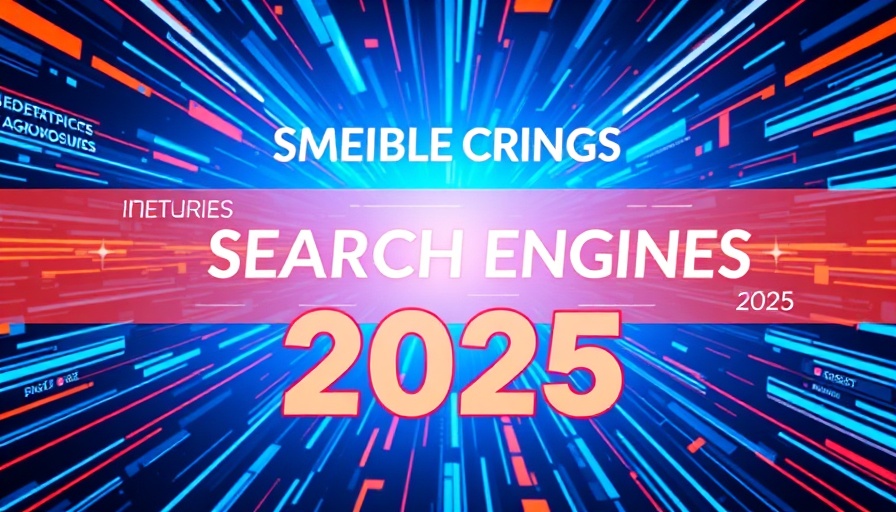
The Changing Landscape of Search Engines: What Lies Ahead for 2025
As the digital world evolves, so does the way we search for information. The year 2025 is poised to bring significant changes to the search engine market, presenting both challenges and opportunities for users and marketers alike. With Google still reigning supreme but gradually losing ground, alternative search engines are beginning to carve out their niches, making the search engine landscape more diverse than ever.
Why Google's Market Share is Shrinking
Google has enjoyed a long-standing monopoly, holding about 89.79% of the global search engine market share as of early 2025. However, recent years have seen cracks in this dominance. Concerns surrounding privacy, antitrust allegations, and a growing discontent among users have prompted many to explore alternatives. According to a Statista report, Google's market share has dipped from 91.47% to 89.62% within a year, reflecting a significant shift in user preferences.
The Rise of Alternative Search Engines
Bing, Yandex, and DuckDuckGo have emerged as popular contenders in the search engine arena, each carving out a unique identity that addresses specific user concerns. For instance, Bing has integrated AI features that enhance the user experience, evidenced by its increase in market share to approximately 4.04% in 2025. Yandex, holding a strong 73% market share in Russia, appeals to users seeking localized content, while DuckDuckGo champions privacy—as it does not track users’ searches or collection of personal data—offering a fresher, safer alternative to the traditional search engine model.
Current Market Leaders and Their Offerings
Here’s a brief glance at the most prominent search engines in 2025:
- Google: Still the industry leader, Google dominates but faces significant challenges, maintaining an impressive but declining market share filled with user concerns over privacy and ads.
- Bing: Traditionally seen as the underdog, Bing is gaining traction through innovation and features like AI-generated results and video search capabilities.
- Yandex: Dominating the Russian market, Yandex offers diverse functionalities similar to Google but tailored for the local market.
- DuckDuckGo: Preferred by those valuing privacy, DuckDuckGo's growth reflects a larger trend away from data-tracking models.
- Yahoo: Not quite the powerhouse it once was, Yahoo still hangs on with improvements in user experience planned for 2024.
What Privacy Concerns Mean for Search Engine Users
With growing awareness of data privacy and the ethical use of personal information, many users are questioning their reliance on Google. As illustrated in Dileep Thekkethil's analysis of Top 10 Search Engines In The World (2025), the future of search could be shaped by users’ shifting perspectives on data security. If trends continue, Google may need to adopt new strategies to maintain its user base. Adequate responses to privacy concerns could lead to innovations that reshape digital interactions across the board.
Future Predictions for Search Engines
The future of search engines will not solely rely on traditional models but will also be influenced by algorithm advancements and AI innovations. Google’s Gemini, aiming to enhance its search functionalities, illustrates this trend. As AI becomes a more integral part of search technology, search engines that adapt proactively will likely emerge as winners. As Emma Richards highlights, understanding these dynamics is of utmost importance for marketers looking to stay ahead in their engagements with consumers.
Conclusion: Embracing Changing Search Dynamics
As we move further into 2025, the search engine industry is set to undergo transformations that will resonate across various facets of digital marketing and online interactions. For marketers, keeping tabs on this shifting landscape is crucial to leverage emerging opportunities effectively. Shifting towards alternative engines can involve a gradual transition to new strategies that embrace user privacy and innovative features, allowing them to attract and maintain consumer engagement in an ever-competitive digital sphere.
Don't miss your chance to stay updated with these evolving trends in search engine marketing. Stay ahead of the curve by subscribing to industry-related newsletters, attending webinars, and connecting with experts in the space. Understanding these trends will not only enrich your strategy but could ultimately drive significant returns on your marketing investments.
 Add Row
Add Row  Add
Add 


Write A Comment